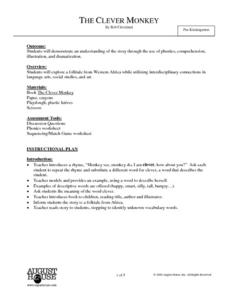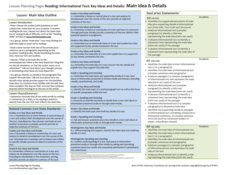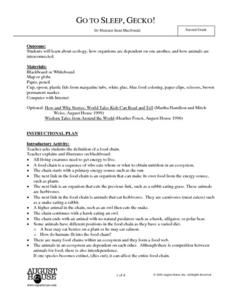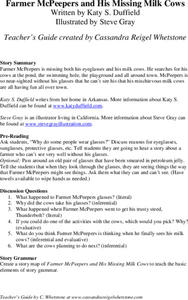Have Fun Teaching
When Am I? (16)
How can you tell when a story takes place? Use context clues to infer the time of day and seasons of five short reading passages. Kids then note each passage's time period as daytime or nighttime, as well as winter or summer.
Have Fun Teaching
Making Inferences Something Special (13)
Work on making inferences with a reading passage and comprehension questions. After kids read a short paragraph about Jalisa's birthday, they infer why she would be excited about receiving gifts from her brother.
Reading Worksheets
Inferences Worksheet 1
Knowing how to make inferences is a very important skill for readers of all ages. Help your pupils master this ability by providing practice. Pupils read four short passages and answer two to three questions about each to practice making...
Reading Worksheets
Inferences Worksheet 2
You might infer that is worksheet is all about making inferences. And you'd be correct! Invite your learners to read four short passages. After reading each passage, pupils make inferences and support their inferences with textual evidence.
Have Fun Teaching
Context Clues (5)
Unfamiliar words can make it difficult to understand what a piece of writing is trying to say. Practice using context clues to define words you don't know with a language arts worksheet, which features five sentences and enough space to...
K12 Reader
Inference Practice 2: Where Am I?
Practice using context clues with a worksheet about making inferences. Five prompts encourage kids to interpret where each event takes place based on the details in each passage.
K12 Reader
Inference in Literature: The Wizard of Oz
We're off to see the wizard! Practice making inferences in literature with two sample paragraphs from L. Frank Baum's The Wonderful Wizard of Oz. Each passage provides questions about the pleasantness of the place it describes, and kids...
Reading for Meaning
Sample Lessons and Worksheets
If you need to bulk up your reading comprehension worksheet collection, take a look at a resource that includes graphic organizers and reading comprehension questions. The series of 50 worksheets addresses novels such as Julie of the...
K12 Reader
Inference Practice: Who Am I?
Have a little fun teaching your class about inferences with this short and simple guess who exercise. Provided with five short passages describing different types of people, young learners must read each one and use the included details...
K12 Reader
Visual Clues
Whether you realize it or not, reading an image and reading a text require similar skills, including the ability to make inferences. For this simple worksheet, children look at a picture of a snowy winter day and answer a series of...
Novelinks
The Color of Water: Family History Assignment
To conclude their study of James McBride's The Color of Water, class members create their own memoir, focusing on a family member who help shape their life.
K12 Reader
What Happens Next?
While your students may not be psychics, that doesn't mean they can't predict what will happen next in a story. To hone this important reading comprehension skill, young learners read a series of three short passages before writing a...
K12 Reader
What Do You See? (Inferences)
Making inferences is a skill that goes beyond the comprehension of written text. For this simple exercise, young learners are provided with a photograph and asked to answer a series of inference questions using only on the information...
Practice Using Lively Language
Comparing Characters
Readers use the provided illustrated Venn diagram to compare and contrast the traits of two characters. A great way to encourage critical thinking skills.
Scholastic
Story Board
Invite your pupils to tell and show what happened in a story that they read by filling out this organizer. Using images and words, kids can fill out the six panels provided here to demonstrate understanding of the sequence of events and...
Ned Show
Rainbow Fish and the Big Blue Whale
If friendship were a soup, what ingredients would be in it? As part of a study of Marcus Pfister's Rainbow Fish and the Big Blue Whale, kids engage in a series of friendship-themed activities using materials contained in this richly...
August House
The Clever Monkey
Your clever kindergartners will enjoy a series of activities based on the West African folktale, The Clever Monkey, adapted by Rob Cleveland. They sequence the story with pictures, copy sentences, illustrate idioms about cats, and taste...
August House
The Clever Monkey Rides Again
Use a West African folktale to practice several different skills in your first grade classroom. Learners read The Clever Monkey Rides Again and focus on rhyming words, reading comprehension, measurement, art, movement, and word order.
Illinois Department of Natural Resources
Section Two: Why is Biodiversity Important?
Explore soil, genetic traits, natural resources, and pollution in a series of lessons that focus on biodiversity. Kids complete experiments to learn more about the importance of varied genes and organisms in an ecosystem.
For the Teachers
Main Idea Outline
Find the main idea in an informational text with a versatile lesson plan. Three levels of differentiation help you implement the strategy in any age or class level, based on the ability and objectives of your learners.
August House
Anansi And Turtle Go To Dinner
That tricky Anansi! Join him and Turtle in the story Anansi and Turtle Go to Dinner by Bobby and Sherry Norfolk, based on the African folktale. Kids answer comprehension questions and sing songs about spiders before creating spider webs...
August House
Go to Sleep, Gecko!
A cute folktale from Bali tells the story of Gecko, Elephant, and Buffalo, and Gecko's struggle to sleep. After reading Go to Sleep, Gecko, learners focus on comprehension questions, singing and learning about geckos, building a house...
Cassandra Reigel Whetstone
Farmer McPeepers and His Missing Milk Cows
Pair your reading of Farmer McPeepers and His Missing Milk Cows with the questions and activities provided here. Learners answer questions about the text, create story maps, put together brochures, relate math to the story, practice some...
August House
The Contest Between the Sun and the Wind
Learn the moral of the story with a series of activities about Aesop's fables. Focusing on The Contest Between the Sun and the Wind, learners complete a graphic organizer to discuss who, what, how, and why the events occur. Additionally,...

























